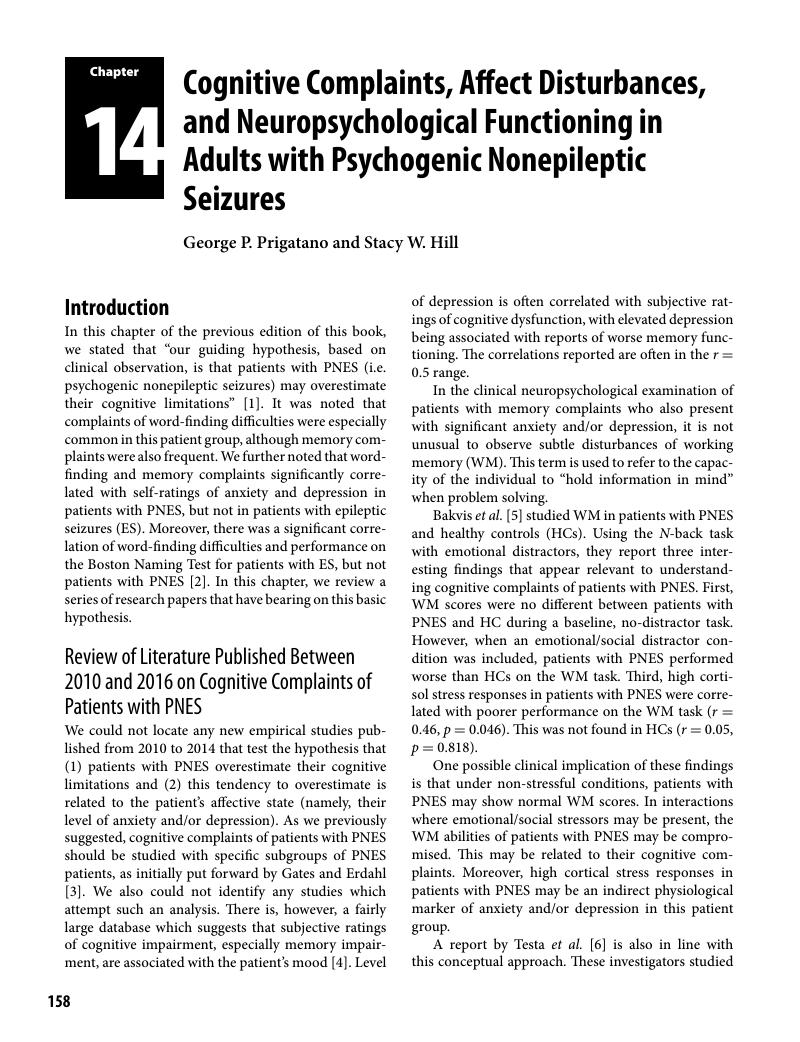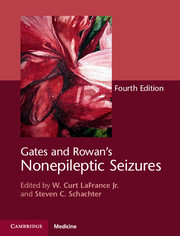Book contents
- Gates and Rowan's
- Gates and Rowan's Nonepileptic Seizures
- Copyright page
- Contents
- Contributors
- Preface
- Acknowledgements
- Video EEGs and Video Clips
- Dedication for Dr. A. James Rowan
- Dedication for Dr. John R. Gates
- In Remembrance of Dr. A. James Rowan
- In Remembrance of Dr. John R. Gates
- Section 1 Recognition, Diagnosis, and Impact of Nonepileptic Seizures
- Section 2 Nonepileptic Seizures: Culture, Cognition, and Personality Clusters
- Chapter 12 Cultural Aspects of Psychogenic Nonepileptic Seizures
- Chapter 13 Use of Neuropsychological and Personality Testing to Identify Adults with Psychogenic Nonepileptic Seizures
- Chapter 14 Cognitive Complaints, Affect Disturbances, and Neuropsychological Functioning in Adults with Psychogenic Nonepileptic Seizures
- Chapter 15 Health-Related Quality of Life
- Chapter 16 Legal Medicine Considerations Related to Nonepileptic Seizures
- Section 3 Psychiatric and Neuropsychological Considerations in Children and Adolescents with Psychogenic Nonepileptic Seizures
- Section 4 Psychiatric and Neuropsychological Considerations in Adults with Psychogenic Nonepileptic Seizures
- Section 5 Treatment Considerations for Psychogenic Nonepileptic Seizures
- Appendix: Care Coordination Treatment Plans for Patients with Psychogenic Nonepileptic Seizures (PNES)
- Index
- References
Chapter 14 - Cognitive Complaints, Affect Disturbances, and Neuropsychological Functioning in Adults with Psychogenic Nonepileptic Seizures
from Section 2 - Nonepileptic Seizures: Culture, Cognition, and Personality Clusters
Published online by Cambridge University Press: 18 May 2018
- Gates and Rowan's
- Gates and Rowan's Nonepileptic Seizures
- Copyright page
- Contents
- Contributors
- Preface
- Acknowledgements
- Video EEGs and Video Clips
- Dedication for Dr. A. James Rowan
- Dedication for Dr. John R. Gates
- In Remembrance of Dr. A. James Rowan
- In Remembrance of Dr. John R. Gates
- Section 1 Recognition, Diagnosis, and Impact of Nonepileptic Seizures
- Section 2 Nonepileptic Seizures: Culture, Cognition, and Personality Clusters
- Chapter 12 Cultural Aspects of Psychogenic Nonepileptic Seizures
- Chapter 13 Use of Neuropsychological and Personality Testing to Identify Adults with Psychogenic Nonepileptic Seizures
- Chapter 14 Cognitive Complaints, Affect Disturbances, and Neuropsychological Functioning in Adults with Psychogenic Nonepileptic Seizures
- Chapter 15 Health-Related Quality of Life
- Chapter 16 Legal Medicine Considerations Related to Nonepileptic Seizures
- Section 3 Psychiatric and Neuropsychological Considerations in Children and Adolescents with Psychogenic Nonepileptic Seizures
- Section 4 Psychiatric and Neuropsychological Considerations in Adults with Psychogenic Nonepileptic Seizures
- Section 5 Treatment Considerations for Psychogenic Nonepileptic Seizures
- Appendix: Care Coordination Treatment Plans for Patients with Psychogenic Nonepileptic Seizures (PNES)
- Index
- References
Summary

- Type
- Chapter
- Information
- Gates and Rowan's Nonepileptic Seizures , pp. 158 - 164Publisher: Cambridge University PressPrint publication year: 2018
References
- 3
- Cited by



